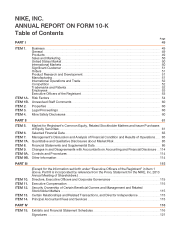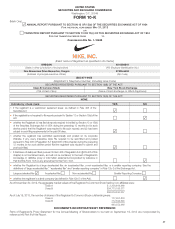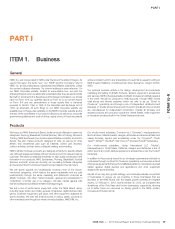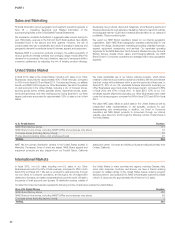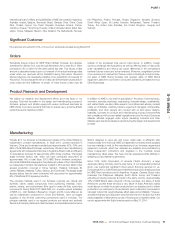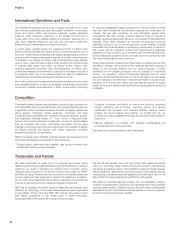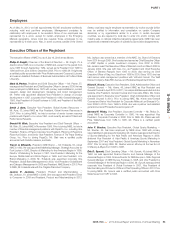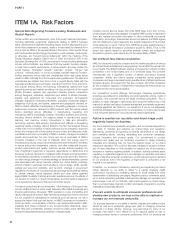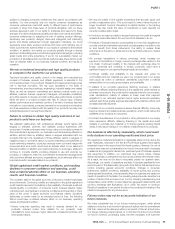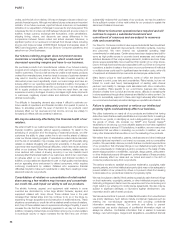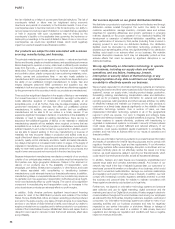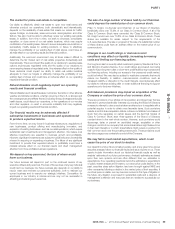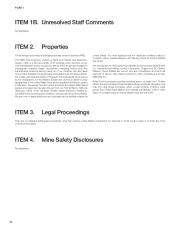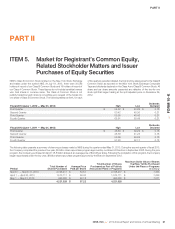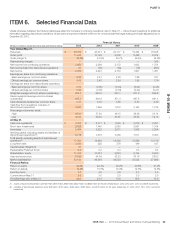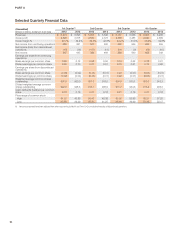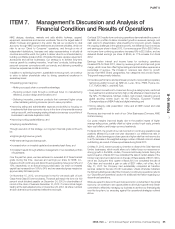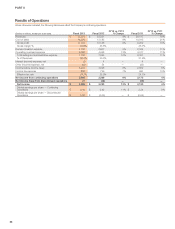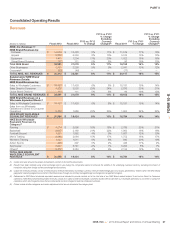Nike 2013 Annual Report Download - page 12
Download and view the complete annual report
Please find page 12 of the 2013 Nike annual report below. You can navigate through the pages in the report by either clicking on the pages listed below, or by using the keyword search tool below to find specific information within the annual report.
PART I
results or personal data could be prematurely or inadvertently used and/or
disclosed resulting in a loss of reputation, a decline in our stock price, a
negative impact on our market position, and could lead to damages, fines,
penalties, or injunctions.
In addition, the laws of certain foreign countries may not protect or allow
enforcement of intellectual property rights to the same extent as the laws of
the United States. We may face significant expenses and liability in connection
with the protection of our intellectual property rights outside the United States,
and if we are unable to successfully protect our rights or resolve intellectual
property conflicts with others, our business or financial condition may be
adversely affected.
We are subject to periodic litigation and other regulatory
proceedings, which could result in unexpected expense of
time and resources.
From time to time we are called upon to defend ourselves against lawsuits
and regulatory actions relating to our business. Due to the inherent
uncertainties of litigation and regulatory proceedings, we cannot accurately
predict the ultimate outcome of any such proceedings. An unfavorable
outcome could have an adverse impact on our business, financial condition
and results of operations. In addition, any significant litigation in the future,
regardless of its merits, could divert management’s attention from our
operations and result in substantial legal fees.
Failure of our contractors or our licensees’ contractors to
comply with our code of conduct, local laws, and other
standards could harm our business.
We work with hundreds of contractors outside of the United States to
manufacture our products, and we also have license agreements that permit
unaffiliated parties to manufacture or contract for the manufacture of products
using our trademarks. We impose, and require the contractors that directly
manufacture our products and our licensees the contract with manufacturers
to make products bearing our trademarks, a code of conduct and other
environmental, health, and safety standards for the benefit of workers. We
also require these contractors to comply with applicable standards for
product safety. Notwithstanding their contractual obligations, from time to
time contractors may not comply with such standards or applicable local law
or our licensees may fail to enforce such standards or applicable local law on
their contractors. Significant or continuing noncompliance with such
standards and laws by one or more contractors could harm our reputation or
result in a product recall and, as a result, could have an adverse effect on our
sales and financial condition.
Our international operations involve inherent risks which
could result in harm to our business.
Virtually all of our athletic footwear and apparel is manufactured outside of the
United States, and the majority of our products are sold outside of the United
States. Accordingly, we are subject to the risks generally associated with
global trade and doing business abroad, which include foreign laws and
regulations, varying consumer preferences across geographic regions,
political unrest, disruptions or delays in cross-border shipments, and changes
in economic conditions in countries in which we manufacture or sell products.
In addition, disease outbreaks, terrorist acts and military conflict have
increased the risks of doing business abroad. These factors, among others,
could affect our ability to manufacture products or procure materials, our
ability to import products, our ability to sell products in international markets,
and our cost of doing business. If any of these or other factors make the
conduct of business in a particular country undesirable or impractical, our
business could be adversely affected. In addition, many of our imported
products are subject to duties, tariffs, or quotas that affect the cost and
quantity of various types of goods imported into the United States and other
countries. Any country in which our products are produced or sold may
eliminate, adjust or impose new quotas, duties, tariffs, safeguard measures,
anti-dumping duties, cargo restrictions to prevent terrorism, restrictions on
the transfer of currency, climate change legislation, product safety regulations
or other charges or restrictions, any of which could have an adverse effect on
our results of operations and financial condition.
Changes in tax laws and unanticipated tax liabilities could
adversely affect our effective income tax rate and
profitability.
We are subject to income taxes in the United States and numerous foreign
jurisdictions. Increases in income tax rates could reduce our after-tax income
from affected jurisdictions. We earn a substantial portion of our income in
foreign countries. If our capital or financing needs in the United States require
us to repatriate earnings from foreign jurisdictions above our current levels,
our effective income tax rates for the affected periods could be negatively
impacted. Current economic and political conditions make tax rules in any
jurisdiction, including the United States, subject to significant change. There
have been proposals to reform U.S. tax laws that could significantly impact
how U.S. multinational corporations are taxed on foreign earnings. Although
we cannot predict whether or in what form these proposals will pass, several
of the proposals being considered, if enacted into law, could have an adverse
impact on our income tax expense and cash flows.
Our effective income tax rate in the future could be adversely affected by a
number of factors, including changes in the mix of earnings in countries with
differing statutory tax rates, changes in the valuation of deferred tax assets
and liabilities, changes in tax laws, the outcome of income tax audits in
various jurisdictions around the world, and any repatriation of non-U.S.
earnings for which we have not previously provided for U.S. taxes. The
Company is also subject to the examination of its tax returns by the Internal
Revenue Service and other tax authorities. We regularly assess all of these
matters to determine the adequacy of our tax provision, which is subject to
significant discretion. Although we believe our tax provisions are adequate,
the final determination of tax audits and any related disputes could be
materially different from our historical income tax provisions and accruals. The
results of audits or related disputes could have an adverse effect on our
financial statements for the period or periods for which the applicable final
determinations are made.
Currency exchange rate fluctuations could result in lower
revenues, higher costs and decreased margins and
earnings.
A majority of our products are sold outside of the United States. As a result,
we conduct transactions in various currencies, which increase our exposure
to fluctuations in foreign currency exchange rates relative to the U.S. Dollar.
Our international revenues and expenses generally are derived from sales and
operations in foreign currencies, and these revenues and expenses could be
affected by currency fluctuations, including amounts recorded in foreign
currencies and translated into U.S. Dollars for consolidated financial reporting.
Currency exchange rate fluctuations could also disrupt the business of the
independent manufacturers that produce our products by making their
purchases of raw materials more expensive and more difficult to finance.
Foreign currency fluctuations could have an adverse effect on our results of
operations and financial condition.
We may hedge certain foreign currency exposures to lessen and delay, but
not to completely eliminate, the effects of foreign currency fluctuations on our
financial results. Since the hedging activities are designed to lessen volatility,
they not only reduce the negative impact of a stronger U.S. Dollar, but they
also reduce the positive impact of a weaker U.S. Dollar. Our future financial
results could be significantly affected by the value of the U.S. Dollar in relation
to the foreign currencies in which we conduct business. The degree to which
our financial results are affected for any given time period will depend in part
upon our hedging activities.
If one or more of our counterparty financial institutions
default on their obligations to us or fail, we may incur
significant losses.
As part of our hedging activities, we enter into transactions involving derivative
financial instruments, which may include forward contracts, commodity
futures contracts, option contracts, collars and swaps, with various financial
institutions. In addition, we have significant amounts of cash, cash equivalents
and other investments on deposit or in accounts with banks or other financial
institutions in the United States and abroad. As a result, we are exposed to
NIKE, INC. 2013 Annual Report and Notice of Annual Meeting 57
FORM 10-K


